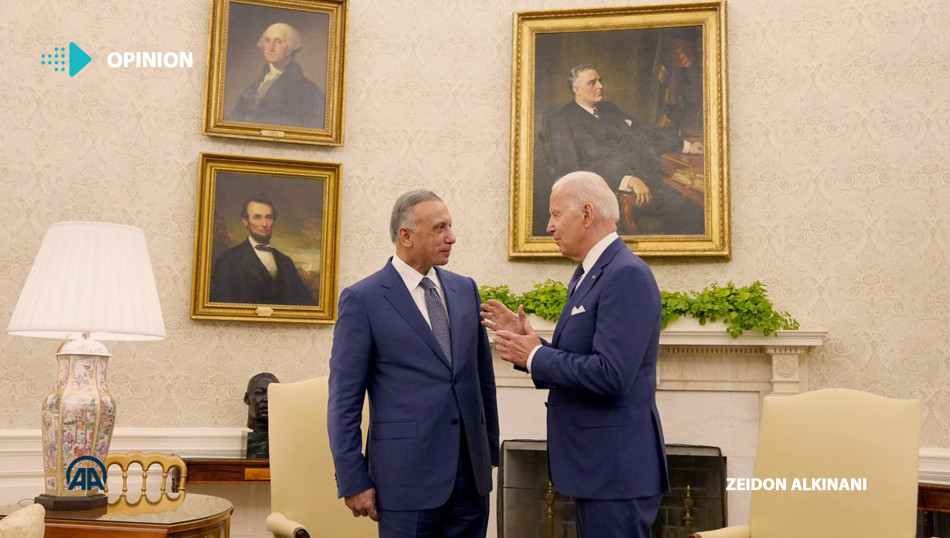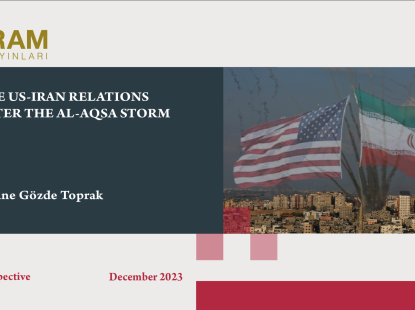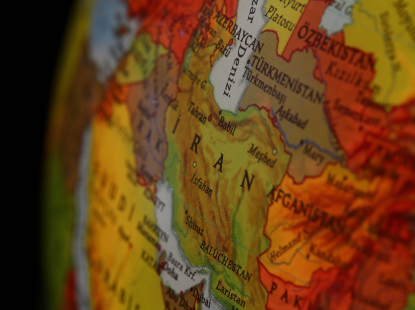Biden’s US Military Withdrawal Between Theory and Practice
US President Joe Biden’s announcement to gradually withdraw US troops from Iraq upon his meeting with Iraq’s Prime Minister Mustafa al-Kadhimi is, in reality, more of a decision on paper rather than in practice, just like many other US foreign policies in Iraq and the beyond the region and unfortunately, the strategic dialogue between Washington and Baghdad has fallen victim to unnecessary discussions with a lack of clear objectives.
The Biden administration and al-Kadhimi’s government might not theoretically be in favor of a US military withdrawal from Iraq. They are both following overarching agendas by their respective governments, with an attempt to overlap with one another.
While Biden is promoting fewer troops abroad in both Afghanistan and Iraq, PM al-Kadhimi must obey the parliamentary vote, which is Iraq's parliamentary vote to expel US forces from the country in early January 2020. It was viewed as a responsive act to the pressures of the pro-Iran camp in Iraq’s parliament and the Popular Mobilization Forces (PMF) who were seeking revenge for the assassination of Qasem Soleimani, former leader of the Islamic Revolutionary Guard Corps's Quds Force, and PMF’s former de facto leader, Abu Mahdi al-Muhandis.
In other words, it is more of a strategic attempt by the Biden administration to support al-Kadhimi in lifting the weight off his shoulders from the Iran-backed militias and political parties calling for the politicized parliamentary vote to be acknowledged. Moreover, while it could also enhance al-Kadhimi’s image prior to the early elections that are supposed to happen this October–a compromise to the anti-government October (Tishreen) protest movement.
This, however, does not necessarily mean that PM al-Kadhimi nor his former predecessors such as Adil Abdul-Mahdi had genuine incentives to push away US troops from Iraq upon the parliamentary vote. Nonetheless, the US unilateral decisions to conduct the strike near Baghdad’s international airport towards Soleimani and Muhandis put Baghdad in a difficult position whenever the pro-Iran camp emphasized on how this act violates Iraqi sovereignty– despite the latter’s constant role in similar acts towards Iraqi civilians and activists.
Now, Despite Muhandis' known leading role in the violent crackdown against the anti-government and reform protests– the act neither protected protesters from further violence nor did it limit Iran's proxy influence in Iraq.
If anything, the US assassination of Soleimani and Muhandis temporarily unified the various pro-Iran factions under the notion of “Anti-Americanism” and calls to end the US military presence in the country, which derives out of the successful political pressuring that occurred in parliament to pass a non-binding resolution calling on canceling the agreement to host US troops in Iraq.
As to understand this through Biden's perspective: this is probably part of a wider Biden strategy in the Middle East and the near east to aim to shift its focus away from terrorism and the Middle East and toward threats, it considers from China and the cyberwarfare. To end America’s post 9/11 era, it withdraws troops from both Afghanistan and Iraq, even if it meant the accurate and efficient security reforms not being in place in both countries.
Although the US withdrawal from Afghanistan is increasingly becoming a tense topic in Washington, the withdrawal from Iraq is unlikely to cause the same difficulties, not least because the announcement is unlikely, in practice, to remove many of the 2,500 US troops currently stationed there. As the New York Times reports, the withdrawal will mostly take place on paper, with many US service members reclassified as serving in an advisory or training capacity.
Biden is aware that a change in US troop designations is unlikely to halt the confrontations between US and Iran-backed militias in Iraq. This makes us question the level of responsibility of the US government carries towards Iraq?
This rushed and unstudied decision is part of a typical, common and long US military strategy in the region. US military intervention in Iraq and Afghanistan should have ended a very long time ago.
In Iraq’s case, it could have ended at the US invasion’s ability to topple the former dictatorship of Saddam Hussein and leave a democratic transition gradually managed by Iraq’s own people. Yet, they decided to remain in the country, despite not finding the alleged weapons of mass destruction, and Saddam Hussein was caught. In addition, they continued to destroy the infrastructure, abolish the state institutions, and damaged the police and armed forces, which eventually left a vulnerable unsecured border which motivated neighboring regional players to exploit.
DAESH, which originated from Al-Qaeda in Iraq and the Iran-backed militias, would not have existed in Iraq if the US military intervention was only limited to the process of regime change.
Iraq's current security position is weaker than ever, with not only sleeping cells of DAES but even proxy networks that are driven by regional powers destabilizing the country based on the agenda of its proxy rulers.
Claiming to withdraw US troops from Iraq for the sake of 'ending an era’ in US foreign policy without assurance of security and political reforms and compensations that would protect the country from the damages caused by the US initial military intervention is selfish, unfair, and will eventually flip back on both Iraq's sovereignty and US interests if considering how Iran's influence will continue to overshadow the American influence in Iraq upon such a withdrawal.
The US attempt to de-militarize its relationship and cooperation with Iraq and showcase its commitment to education and economic development is certainly encouraged. However, it must not happen under a failed and ignored the strategically military situation.











